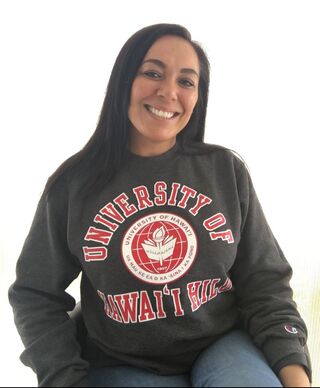FROM OUR MENTEES & MENTORS
A DIFFERENT APPROACH TO HELPING
Jessica Caravalho
Volunteer Mentor Jessica Caravalho was introduced to Going Home Hawai`i as a client herself. She was admitted into Drug Court without a high school diploma, low zest for life, distrust from her loved ones, and oppressed by addiction.With the help of social support services, such as Going Home Hawai’i, Jessica discovered her interests and passions and rebuilt her life. Today she is pursuing a Master’s Degree in social work at the University of Hawai`i at Manoa and is the Board President of Friends of Big Island Drug Court. In May 2019, she received her certification as a GHH Mentor and has already mentored three Mentees. Below are excerpts from an interview with Jessica in January 2021.
|
Why I Became a Mentor
What led me to becoming a Mentor was seeing what people in this role can do for others. I represent a population that has been oppressed and dealing with drug abuse. I have that background and experience. Through the people in social services working with me, I was able to receive the guidance that I needed to discover my interests, embark on my academic journey, build relationships with my loved ones and community, and ultimately self-discovery. Now I’m working on my Master’s in social work.
A Different Approach to Helping
Being a Mentor for Going Home Hawai`i is a different approach to helping someone. We can help by meeting the Mentee where they’re at, allowing them to be themselves and be honest. Through that honesty, they can discover their obstacles. I don’t represent an agency that dictates their lives. They can be fully honest without fear of judgment or consequence. Positive approval of the circumstances in their lives is really important.
I don’t sit there and set goals for the Mentees. Having the space to develop their own ideas is excellent for their emotional and cognitive growth. A lot of the time, they’re treated as children by the system, without the freedom of self-direction.
Mentoring as a Social Work Student
As someone pursuing a Master’s in social work, I’ve learned lessons you can’t get from academics. Being a mentor teaches me to meet people where they’re at. It builds empathy. What better way to help someone than by understanding their circumstances? This is important because the things you learn in school can’t be applied in the real world unless you have understanding and empathy.
The Mentor-Mentee Relationship
I enjoy my work as a Mentor because I’m not an employee that is obliged to adhere to protocol. Mentee and Mentor are left to decide how to move forward with their relationship to accomplish positive change. Mentors are not probation officers, we’re not social workers or counselors. I’m just there as someone to talk to. Going into the program, one thing that might be hard to understand at first is that your Mentee’s success or failure is not your responsibility. Two of my Mentees hit obstacles, and that’s ok. That’s why we as Mentors are present: no one is perfect, and Mentees need someone who will not condemn them or look down on them for failing. They are already dealing with judgment, conviction, and condemnation. It’s important as Mentors to remember that you’re an equal. Don’t think of yourself as the better one. The relationship is mutual.
Most Challenging Aspect of Mentoring
Time management. If you’re also working and going to school, it can be difficult. COVID made it a little more difficult, but now we’re also using technologies such as text messaging and video conferencing to continue to meet.
Most Rewarding Aspect of Mentoring
Hearing their successes and accomplishments, seeing their joy and happiness. It’s also rewarding to hear their fears and worries, because that tells me they’re comfortable enough to confide in me. It’s a sign that I’ve earned their trust. One of my Mentees ran into some obstacles and had to transition to a higher level of care on O’ahu. But she still calls me, and I write to her. That tells me that my purpose as a Mentor -- just being someone to talk to and be supported by -- has been served.
It’s also been good for my family. They see me going to meet my Mentee. It’s good for them to see that giving of ourselves without expectation of return is valuable because they see it in my life and I enjoy my Mentee relationships. They see how much I personally care for each of my Mentees. It paves the road for my children and grandchildren to also give of themselves to help others without expectation.
What Made You Decide to Pursue a Master’s in Social Work?
GHH helps people transition from custody back into the community with the goal of reducing recidivism and promoting the safety of us all. My goal is to work as a social worker within the prison system and connect with people before their release back home. I understand how important that early connection is. And I know that with a master’s degree in social work I can do more. I could even impact policy at the political level.
What led me to becoming a Mentor was seeing what people in this role can do for others. I represent a population that has been oppressed and dealing with drug abuse. I have that background and experience. Through the people in social services working with me, I was able to receive the guidance that I needed to discover my interests, embark on my academic journey, build relationships with my loved ones and community, and ultimately self-discovery. Now I’m working on my Master’s in social work.
A Different Approach to Helping
Being a Mentor for Going Home Hawai`i is a different approach to helping someone. We can help by meeting the Mentee where they’re at, allowing them to be themselves and be honest. Through that honesty, they can discover their obstacles. I don’t represent an agency that dictates their lives. They can be fully honest without fear of judgment or consequence. Positive approval of the circumstances in their lives is really important.
I don’t sit there and set goals for the Mentees. Having the space to develop their own ideas is excellent for their emotional and cognitive growth. A lot of the time, they’re treated as children by the system, without the freedom of self-direction.
Mentoring as a Social Work Student
As someone pursuing a Master’s in social work, I’ve learned lessons you can’t get from academics. Being a mentor teaches me to meet people where they’re at. It builds empathy. What better way to help someone than by understanding their circumstances? This is important because the things you learn in school can’t be applied in the real world unless you have understanding and empathy.
The Mentor-Mentee Relationship
I enjoy my work as a Mentor because I’m not an employee that is obliged to adhere to protocol. Mentee and Mentor are left to decide how to move forward with their relationship to accomplish positive change. Mentors are not probation officers, we’re not social workers or counselors. I’m just there as someone to talk to. Going into the program, one thing that might be hard to understand at first is that your Mentee’s success or failure is not your responsibility. Two of my Mentees hit obstacles, and that’s ok. That’s why we as Mentors are present: no one is perfect, and Mentees need someone who will not condemn them or look down on them for failing. They are already dealing with judgment, conviction, and condemnation. It’s important as Mentors to remember that you’re an equal. Don’t think of yourself as the better one. The relationship is mutual.
Most Challenging Aspect of Mentoring
Time management. If you’re also working and going to school, it can be difficult. COVID made it a little more difficult, but now we’re also using technologies such as text messaging and video conferencing to continue to meet.
Most Rewarding Aspect of Mentoring
Hearing their successes and accomplishments, seeing their joy and happiness. It’s also rewarding to hear their fears and worries, because that tells me they’re comfortable enough to confide in me. It’s a sign that I’ve earned their trust. One of my Mentees ran into some obstacles and had to transition to a higher level of care on O’ahu. But she still calls me, and I write to her. That tells me that my purpose as a Mentor -- just being someone to talk to and be supported by -- has been served.
It’s also been good for my family. They see me going to meet my Mentee. It’s good for them to see that giving of ourselves without expectation of return is valuable because they see it in my life and I enjoy my Mentee relationships. They see how much I personally care for each of my Mentees. It paves the road for my children and grandchildren to also give of themselves to help others without expectation.
What Made You Decide to Pursue a Master’s in Social Work?
GHH helps people transition from custody back into the community with the goal of reducing recidivism and promoting the safety of us all. My goal is to work as a social worker within the prison system and connect with people before their release back home. I understand how important that early connection is. And I know that with a master’s degree in social work I can do more. I could even impact policy at the political level.




